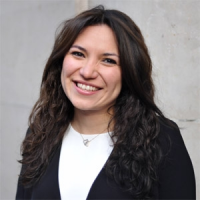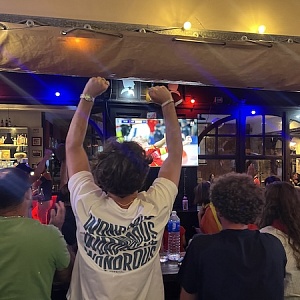Six Months in Paris
-
Written by Pamela Molina - IMBA Student - Mexico

- IMBA Student Blog
Studying at ISM has been one of the best experiences I’ve had so far in my life. The MBA program here is truly an international program that connects people from all around the world, helping us learn about other traditions, languages, opinions, and ways of thinking and living.
I started my MBA four months ago, and each of the seminars I’ve taken has been a different and exciting experience. Before each seminar, you never know which new challenges you are going to face, the professor’s teaching style, or which new students you may be interacting with. Every seminar is a challenge that fills me with adrenaline.
Coming from Mexico City to a different continent to do my MBA has been overall very fulfilling. Living in France and studying in English pushes you to the limit and keeps you wondering what new things you’ll have to go through every day.
One of my favorite seminars was Advertising and Communications. During the seminar, we had the opportunity to go on a business site visit with Professor Nathan Sambul. He explained theory with interesting real-life examples and relevant topics. The seminar was dynamic and applicable in our daily and future working lives. Every oth
The coldest months. That would resume them fairly well for me. Since my arrival in September, Paris has become colder month after month. Now I understand why people at the beginning told me that I had to take advantage of the sun during the first few months (which made me laugh as the standard for what constitutes significant sunlight is much higher in my country). Staying in Paris for Christmas and New Year’s Eve was an amazing experience. It was the first time in my life that I was outside the United States during those dates. Walking through any Parisian street definitely felt like I was cast in some sort of movie.
Some tips I would give to young people living in Paris would be:
- Learn French. It’s harder without it here. Most people say they know English, but they don’t, trust me. I started by watching movies with French subtitles, then moved on to watching TV series I’d already seen, such as “Friends,” in French. This allows you to have some context for what is happening and to more easily relate it to French words. Speaking French is like an aerobic exercise. The more you practice, the better you get. Most French people like to see that you are trying to speak their language and won’t be rude accordingly. Get to know people that speak French. This creates the proximity needed to say more than just “oui” or “non.” It also allows you to have the space and comfort to give your real opinion. After I knew I could survive with the language, I decided to start taking French classes to improve my writing. That is a whole new subject. Even French people of our age still have trouble writing in their own language. I registered for classes at a French school called “Alliance Française,” which happens to be on the same street as ISM (very convenient for us). If you haven’t taken French already, I recommend following these tips. I can say from experience that they have been enormously useful for me.
- Paris is seen as an expensive city, though how pricey it is depends largely on one’s own decisions. You can find nice cheap places to eat, drink, or do your groceries. During the seminars, we searched around the district area for such places and found a treasure trove. One of our favorites is Cojean, a restaurant on the corner of our school with fresh, balanced, and inexpensive food. Of course, any Parisian boulangerie or patisserie can give you a tasty sandwich, Panini, crepe, or croissant at a reasonable price when hunger strikes. You can also upload apps like TripAdvisor or Yelp where you can see which restaurants are best ranked and then do your own due diligence. In my experience, Asian food on Rue Saint Anne near Opera, Le Marché des Enfants Rouges in Le Marais, and any restaurant on my favorite street Montergueil between the 1st and 2nd district are always good options. For those who aren’t teetotalers, there are a lot of restaurants or bars that have happy hours (which mean low-cost drinks or cocktails at certain hours every day). For grocery shopping, there are some supermarkets that aren’t as expensive as the most popular ones, like the G20, %, or Dia. For fruit and vegetables, it’s better to go to a street market where you will find fresh and cheaper products. For bread, cheese, and charcuterie, buying at the supermarket may save you a bit, but the quality tends to be lower; the best quality will almost always be at the boulangeries or fromageries.
- Don’t stop going to touristic places. Even if you’re living here, there is so much to do in this city. There’s so much history, fashion, restaurants, and bars that you can’t really stop finding more to do. I just went to the Louvre museum. It had been a while since the last time I went to visit it. It is impressive how big it is. Even if you spent just a few seconds on each piece, it would take months. Based on how many people from around the world you can see there, it is no wonder why Paris is the most visited city in the world. The cherry on top was that it was free with the ISM student card (if you’re under 26 like me). If you’re under 30, the woman at the information center gave us a tip that you can get a special card that you can buy at the “Ami du Louvre” office. By paying 35 euros, you can have unlimited access to the museum for a year. I think this is a very good deal, since when you’re living here you get many outside visitors who will definitely want to go. Whether an incoming student or simply sizing us up for a visit, the most important takeaway is that Paris is always a good idea.









